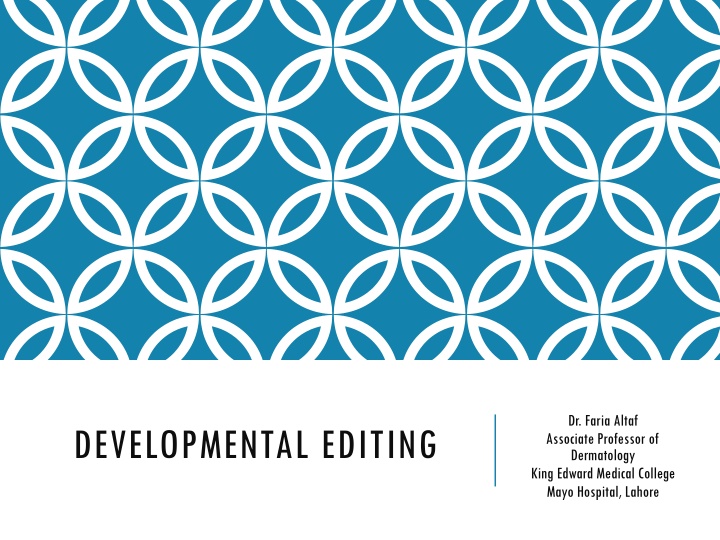
Developmental Editing in Writing: A Comprehensive Guide
Dive into the world of developmental editing, also known as conceptual editing, and learn how it enhances the quality of non-fiction manuscripts by focusing on structure, narrative, and language. Discover the importance of developmental editing in refining the storytelling process, and explore its role in various projects like books, articles, and dissertations.
Download Presentation

Please find below an Image/Link to download the presentation.
The content on the website is provided AS IS for your information and personal use only. It may not be sold, licensed, or shared on other websites without obtaining consent from the author. If you encounter any issues during the download, it is possible that the publisher has removed the file from their server.
You are allowed to download the files provided on this website for personal or commercial use, subject to the condition that they are used lawfully. All files are the property of their respective owners.
The content on the website is provided AS IS for your information and personal use only. It may not be sold, licensed, or shared on other websites without obtaining consent from the author.
E N D
Presentation Transcript
Dr. Faria Altaf Associate Professor of Dermatology King Edward Medical College Mayo Hospital, Lahore DEVELOPMENTAL EDITING
LEARNING OBJECTIVES What is developmental editing How do they work together Projects Scenarios
WHAT IS EDITING Carefully reviewing material before it is published Suggesting or making changes to improve it
Developmental editing also called conceptual editing or manuscript appraisal, is a form of writing support that comes into play before or during the production of a publishable manuscript, especially in the area of non-fiction writing DEVELOPMENTAL EDITING
An approach that divides the developmental note into three principal sections: structure, narrative, and language Structure is the container that holds the story, including its length, order and pacing DEVELOPMENTAL EDITING Narrative is all of the story elements, such as characters, major scenes, continuity, and authenticity Language includes dialogue, physical description, sensory information, and sentence structure
Writers often struggle with keeping perspective on their own work They re too close to it to know what does or doesn t work for another reader IMPORTANCE OF DEVELOPMENTAL EDITING Writers unconsciously fill in the narrative gaps with their own knowledge of the book They can be enthralled with their subject, without considering general interest It s about showing the writer what works.
It denotes significant structuring or restructuring of the manuscript s discourse WHAT IT IS AND ISN T It is not line by line correction
PROJECTS BOOKS ARTICLES DISSERTATIONS
You want to talk through new book ideas BEGINNING A PROJECT You want feedback on book prospectus draft
STUCK IN THE SOGGY MIDDLE You ve written the first half of the book. Now what? You have a first draft of an article. But you think you have two competing arguments!
You want feedback about argument, structure, and evidence COMPLETED BUT NOT READY FOR REVIEW You re not sure which journal is a good fit You ve finished the article, but its 2,000 words over the limit
You dont want to read reviewer reports. Or you have, and you re in a rage. They can read them for you REVISE & RESUBMIT You ve decided to revise, but don t know how to sort the comments into actionable tasks
There are a few things that all writers should be clear when considering a developmental edit: Find a good editor Be open minded Be prepared to rewrite Focus on the big picture Practice patience DEVELOPMENTAL EDITING PROCESS
A few years of experience in the publishing industry Book editing experience with the genre you re writing. FIND A GOOD EDITOR Compatible with your personality, understand your writing style, and provide open and honest communication while also respecting your vision. Knowledgeable about the entire publishing process in order to properly guide you
Developmental editing is comprehensive, and it s easy to get distracted by the endless small details you want to nit-pick, but there s plenty of time to do that during the line editing phase FOCUS ON THE BIG PICTURE When it comes to developmental editing, the focus should be more about the bigger ideas, and how all the main pieces of the story work together first
Although a necessary step, some authors find it difficult to receive critical feedback on their writing. Sometimes an editor s critique will involve you cutting out particular moments within your story that you don t necessarily want to lose. However, if you find yourself constantly at odds with your editor over your work, it s possible they might not be the right fit for you BE OPEN MINDED
A developmental editor may completely shake up the foundation of your manuscript, resulting in a substantial rewrite BE PREPARED TO REWRITE You may have to reconsider certain plot elements, characters, settings, or conversations that aren t telling your story the way you think
Addressing one round of notes from a developmental editor doesn t mean you re done, or even close to it. PRACTICE PATIENCE This editing process is the most involved, and oftentimes changing one part of a manuscript can result in a necessary change elsewhere but be patient. It s worth the time to ensure your manuscript is telling the story you want, and your editor can help you stay on track!!
